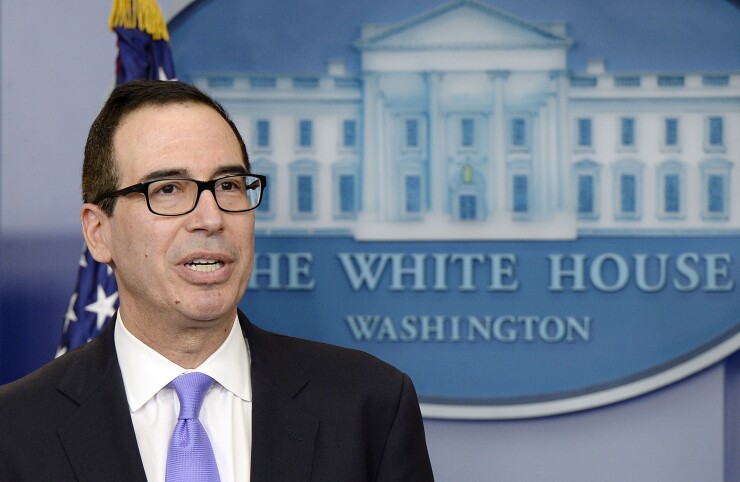WASHINGTON – The “best guess’’ of the Bipartisan Policy Center is that Congress has until October or November to increase the federal debt limit, Shai Akabas, the center’s director of fiscal policy, said Monday.
The BPC's estimate echoes an assurance Treasury Secretary Steven Mnuchin gave reporters Friday in Ottowa during a joint press conference with Canadian Finance Minister Bill Morneau and his statements on Monday to House lawmakers. It indicates that Treasury's halt of sales of state and local government series securities (SLGS) to municipal issuers may continue for another five or six months.

Mnuchin wants Congress to vote on the debt limit by the end of July, but said Friday that nation would “be fine’’ if Congress adjourns for a five-week August recess before approving an increase in the debt ceiling.
He echoed that message Monday in testimony to the House Appropriations Committee's Subcommittee on Financial Services and General Government.
“If for whatever reason Congress does not act before August, we do have backup plans that we can fund the government,'' he told the committee. "So I want to make it clear that is not the time frame where we create a serious problem. However, markets don’t want us to wait. The sooner we do this the better. There could be events in the world that make it more difficult for us to borrow and I am very interested in doing this as soon as possible.’’
Mnuchin also repeated his preference for a so-called clean bill that is not tied to budget cuts. “The debt ceiling should not be a Republican issue or a Democrat issue,'' he said. "It should be an acknowledgment that we have spent the money and need to fund the government.’’
The Treasury secretary has not yet sent Congress a letter estimating when the deadline to act will be. He indicated Monday he prefers to not announce a date. "I am comfortable saying we can run the government through the beginning of September,'' he said.
Mnuchin’s two predecessors as Treasury secretary, Timothy Geithner in 2011 and Jacob Lew in 2015, both sent notifications about three months in advance of the deadline.
Akabas of the BPC predicted that Mnuchin will soon similarly notify Congress of the latest estimates on the debt limit.
Mnuchin sent a letter to Congress March 16 informing lawmakers that Treasury had begun taking extraordinary measures because the debt ceiling had been reached. On March 15, the suspension of the national debt limit under the Bipartisan Budget Act of 2015 expired.
The March 16 extraordinary actions included a suspension of the sale of SLGS. Treasury generally sells between $5 billion and $12 billion of these securities each month, according to the Congressional Budget Office.
Treasury also has suspended contributions to the Civil Service Retirement and Disability Fund and the Postal Service Retiree Health Benefits Fund that are not immediately needed to pay beneficiaries. And it has stopped investments in the Government Securities Investment Fund (G Fund) of the Federal Employees' Retirement System.





